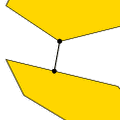|
CGAL 4.8.1 - Optimal Distances
|
|
CGAL 4.8.1 - Optimal Distances
|

The optimization code uses infix OPTIMISATION in the assertions, e.g. defining the compiler flag CGAL_OPTIMISATION_NO_PRECONDITIONS switches precondition checking off, cf. Section Checks.
CGAL::Polytope_distance_d<Traits>CGAL::Polytope_distance_d_traits_2<K,ET,NT>CGAL::Polytope_distance_d_traits_3<K,ET,NT>CGAL::Polytope_distance_d_traits_d<K,ET,NT>PolytopeDistanceDTraits Modules | |
| Concepts | |
Classes | |
| class | CGAL::Polytope_distance_d< Traits > |
An object of the class Polytope_distance_d represents the (squared) distance between two convex polytopes, given as the convex hulls of two finite point sets in \( d\)-dimensional Euclidean space \( \E^d\). More... | |
| class | CGAL::Polytope_distance_d_traits_2< K, ET, NT > |
The class Polytope_distance_d_traits_2 is a traits class for the \( d\)-dimensional optimisation algorithms using the two-dimensional CGAL kernel. More... | |
| class | CGAL::Polytope_distance_d_traits_3< K, ET, NT > |
The class Polytope_distance_d_traits_3 is a traits class for the \( d\)-dimensional optimisation algorithms using the three-dimensional CGAL kernel. More... | |
| class | CGAL::Polytope_distance_d_traits_d< K, ET, NT > |
The class Polytope_distance_d_traits_d is a traits class for the \( d\)-dimensional optimisation algorithms using the \( d\)-dimensional CGAL kernel. More... | |
| class | CGAL::Width_3< Traits > |
| Given a set of points \( \mathcal{S}=\left\{p_1,\ldots , p_n\right\}\) in \( \mathbb{R}^3\). More... | |
| class | CGAL::Width_default_traits_3< K > |
The class Width_default_traits_3 is a traits class for Width_3<Traits> using the three-dimensional CGAL kernel. More... | |
Functions | |
| template<class RandomAccessIterator , class OutputIterator , class Traits > | |
| OutputIterator | CGAL::all_furthest_neighbors_2 (RandomAccessIterator points_begin, RandomAccessIterator points_end, OutputIterator o, Traits t=Default_traits) |
computes all furthest neighbors for the vertices of the convex polygon described by the range [points_begin, points_end), writes their indices (relative to points_begin) to othe furthest neighbor of points_begin[i] is points_begin[i-th number written to o] and returns the past-the-end iterator of this sequence. More... | |
| OutputIterator CGAL::all_furthest_neighbors_2 | ( | RandomAccessIterator | points_begin, |
| RandomAccessIterator | points_end, | ||
| OutputIterator | o, | ||
| Traits | t = Default_traits |
||
| ) |
computes all furthest neighbors for the vertices of the convex polygon described by the range [points_begin, points_end), writes their indices (relative to points_begin) to othe furthest neighbor of points_begin[i] is points_begin[i-th number written to o] and returns the past-the-end iterator of this sequence.
The function all_furthest_neighbors_2() computes all furthest neighbors for the vertices of a convex polygon \( P\), i.e. for each vertex \( v\) of \( P\) a vertex \( f_v\) of \( P\) such that the distance between \( v\) and \( f_v\) is maximized.
points_begin, points_end) form the boundary of a convex polygon \( P\) (oriented clock- or counterclockwise).The geometric types and operations to be used for the computation are specified by the traits class parameter t. This parameter can be omitted if RandomAccessIterator refers to a point type from a Kernel. In this case, the kernel is used as default traits class.
Requires
t is specified explicitly, Traits is a model for AllFurthestNeighborsTraits_2. RandomAccessIterator is Traits::Point_2 or, if t is not specified explicitly, K::Point_2 where K is a model for Kernel. OutputIterator accepts int as value type. AllFurthestNeighborsTraits_2 CGAL::monotone_matrix_search()Implementation
The implementation uses monotone matrix search [1]. Its runtime complexity is linear in the number of vertices of \( P\).
Example
The following code generates a random convex polygon p with ten vertices, computes all furthest neighbors and writes the sequence of their indices (relative to points_begin) to cout (e.g. a sequence of 4788911224 means the furthest neighbor of points_begin[0] is points_begin[4], the furthest neighbor of points_begin[1] is points_begin[7] etc.).
File Polytope_distance_d/all_furthest_neighbors_2.cpp
#include <CGAL/all_furthest_neighbors_2.h>